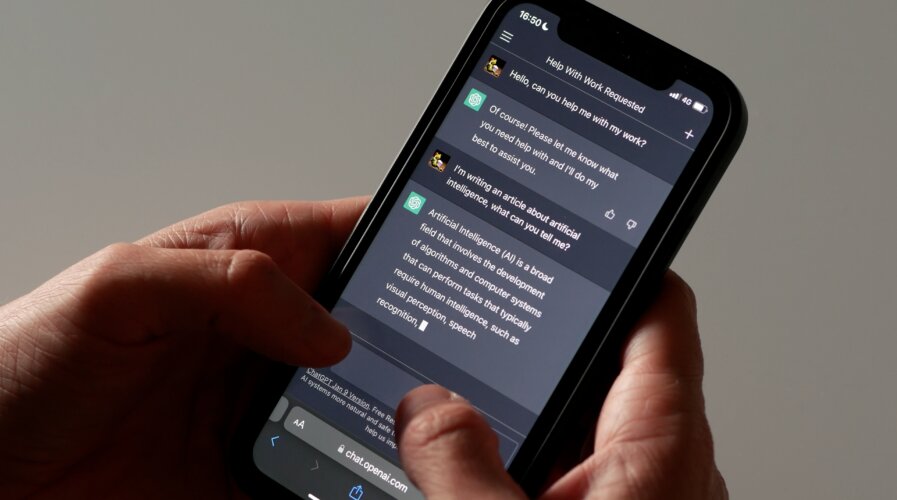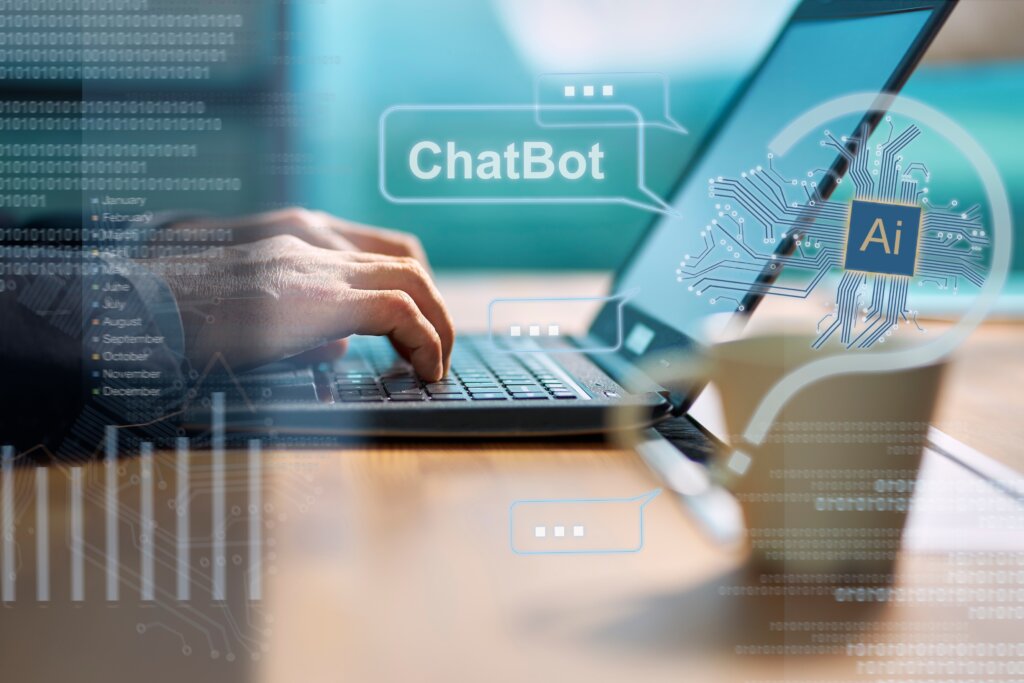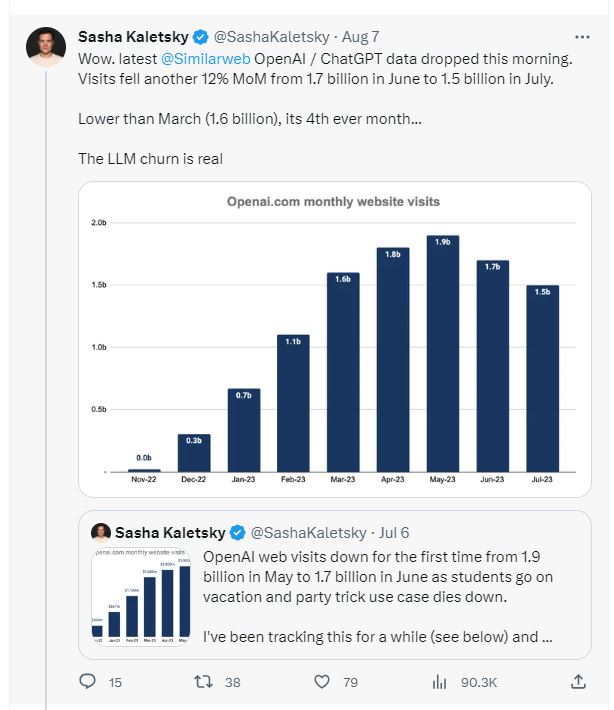
Can businesses limit the use of ChatGPT at work? (Image – Shutterstock)
Increasing ChatGPT use at work a concern for business
|
Getting your Trinity Audio player ready... |
When ChatGPT made its debut about a year ago, its use for enhancing work was quickly felt by industries worldwide. Within weeks of its release, almost everyone had tried to use ChatGPT for at least one work task.
The most basic tasks include getting ChatGPT to write emails and reword work reports. While these tasks may be basic, they save employees plenty of time. Soon, ChatGPT’s use in the workplace accelerated.
The success of ChatGPT led to other tech companies developing generative AI solutions as well. Today, almost every tech company is offering a generative AI solution. This includes generative AI chatbots for customer service, generative AI solutions for retail, and even generative AI solutions for coding, to name a few.
In fact, a recent Gartner poll of more than 2,500 executive leaders also showed that 45% reported that the publicity of ChatGPT has prompted them to increase AI investments. 70% of executives said their organization is in investigation and exploration mode with generative AI, while 19% are in pilot or production mode.

Most employees are still using ChatGPT at work. (Image – Shutterstock)
However, the increased use of ChatGPT raises some concerns. For one, the data uploaded into the prompt will eventually be publicly available. There were also concerns about how ChatGPT and other generative AI solutions weren’t properly attributing their data sources.
In May 2023, Samsung Electronics banned all its employees from using ChatGPT and other generative AI tools. The decision was made after the company discovered its staff uploading sensitive code to the platform. Bloomberg reported that earlier in April, Samsung engineers accidentally leaked internal source code by uploading it to ChatGPT, according to the memo. It’s unclear what the information encompassed.
Here are some of the other big companies that have banned or limited the use of ChatGPT and generative AI tools in the workplace include:
- Apple – restricted its employees from using ChatGPT and other AI tools like GitHub CoPilot.
- Spotify – restricted the use of ChatGPT to protect artists’ royalties.
- Verizon – made ChatGPT unavailable on its corporate systems to limit the risk of losing control of customer information and source code.
- JPMorgan Chase – comply with the company’s policy to limit its usage of third-party software.
- Goldman Sachs – restricted employees from using ChatGPT to avoid compliance issues around third-party software.

A Tweet on the drop in ChatGPT use.
Limiting the use of ChatGPT
Interestingly, new research from BlackBerry Limited revealed that 75% of organizations worldwide are currently implementing or considering bans on ChatGPT and other Generative AI applications within the workplace.
The research showed that 61% of those deploying or considering bans said the measures are intended as long-term or permanent, with risks to data security, privacy, and corporate reputation driving decisions to take action. 83% also voiced concerns that unsecured apps pose a cybersecurity threat to their corporate IT environment.
At the same time, while there is concern about the increasing use of ChatGPT and other generative AI tools at work, the majority of businesses also recognize the opportunity for such applications in the workplace to increase efficiency (55%) and innovation (52%), and enhance creativity (51%). Regarding using Generative AI tools for cybersecurity defense, most respondents (81%) remained in favor, suggesting that IT decision-makers don’t want to be caught flat-footed and give cybercriminals the upper hand.
To Shishir Singh, Chief Technology Officer, Cybersecurity at BlackBerry, organizations must take a cautious yet dynamic approach to Generative AI applications in the workplace.
“Banning Generative AI applications in the workplace can mean many potential business benefits are quashed. At BlackBerry, we are innovating with enterprise-grade Generative AI, keeping a steady focus on value over hype, and exercising caution with unsecured consumer Generative AI tools. As platforms mature and regulations take effect, flexibility could be introduced into organizational policies. The key will be having the right tools in place for visibility, monitoring, and management of applications used in the workplace.”
AI in cybersecurity
But here’s the thing. Can businesses control their employees using ChatGPT and other generative AI? Generative AI is no doubt a game-changing technology that can boost productivity. Can companies find a way to use it without compromising security?
BlackBerry’s research highlights that 80% of IT decision-makers agree that organizations are within their rights to control the applications that employees use for business purposes. However, 74% also think such bans signal “excessive control” over corporate and BYO devices.
As such, businesses could look to unified endpoint management (UEM) to provide the required controls over which applications can connect to the corporate environment, ensuring enterprise security and user privacy by containerizing corporate data. At a time when consumer-grade Generative AI and other unregulated applications are unsecured, an enterprise-grade UEM solution is critical to organizations.
When it comes to cybersecurity, AI could be a game-changer as well. For example, BlackBerry’s updates to its AI engine have enhanced threat prediction capabilities for organizations by 40% compared with earlier versions. BlackBerry’s Cylance AI has unfailingly protected businesses and governments globally from cyberattacks since its inception, with a multi-year predictive advantage.
The new engine builds upon previous iterations that stop attacks 12 times faster and with 20 times fewer resources than other cybersecurity solutions.
“With the introduction of our next-generation AI engine, we are taking cybersecurity to the next level and proving that predictive solutions are not only the future but are a reality today,” commented Nathan Jenniges, Vice President of Product Strategy at BlackBerry Cybersecurity.
READ MORE
- Safer Automation: How Sophic and Firmus Succeeded in Malaysia with MDEC’s Support
- Privilege granted, not gained: Intelligent authorization for enhanced infrastructure productivity
- Low-Code produces the Proof-of-Possibilities
- New Wearables Enable Staff to Work Faster and Safer
- Experts weigh in on Oracle’s departure from adland


